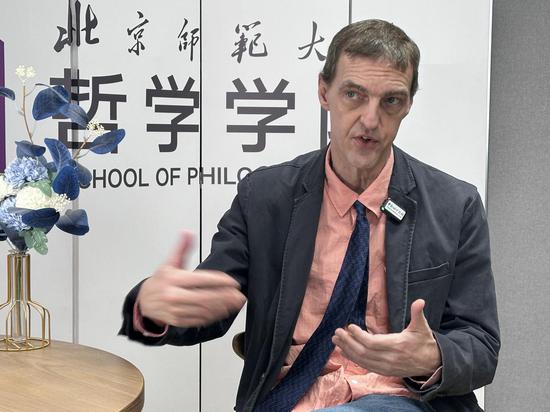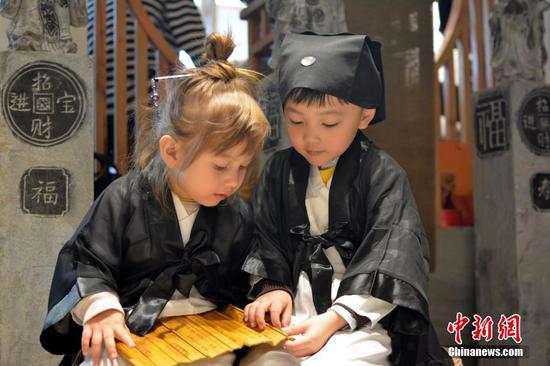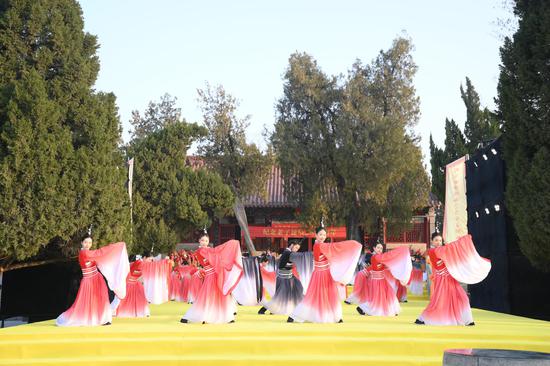[Opinion]Thomas Michael: The Westward Transmission of Eastern Learning—Why Does Daoist Thought Resonate More Profoundly?
As a classic work of Daoism, the Daodejing has been translated into nearly a hundred languages, making it the most translated Chinese cultural classic. The philosophical concepts of Daoism such as "Dao (道)", "governing by doing nothing (无为而治)", and "the merged unity of heaven and man (天人合一)" have fascinated many Western scholars. On the occasion of the second Wuyi Forum, Thomas Michael, an American scholar and researcher at the School of Philosophy of Beijing Normal University, gave an exclusive interview to "W.E. Talk" of China News Service, sharing his views on the wisdom of Daoist thought.

Here are excerpts of the interview:
CNS: What got you interested in Daoism? Why did you choose to work in China?
Thomas Michael: When I was in university, I took a Chinese literature and translation course and read a lot of chinese poems. And there were poems about those fishermen with big hats by the quiet lakes fishing all the time. I really liked these fishermen and it turned out that they were all Daoist. To gain a better understanding of Daoism, I got a copy of the Daodejing from my professor. I read it and then I just fell in love with the Daodejing and began to delve deeper into this field.
When I was in America I spent so much time teaching, and I had very little time for publishing and research. So when I was invited to take a position at Beijing Normal University, I did it without hesitation. So since I've been here, I've learned so much more about Daoism and so much more about Chinese philosophy. Speaking with Chinese scholars in the field throughout China, my feeling for Daoism has just grown so deeply and that's what I wanted to explore by coming to China.
CNS: Is Daoism more popular in the West than Confucianism, and why?
Thomas Michael: Certainly. Confucianism is more built into a Chinese cultural system and it's more difficult for western people to really understand that. Confucius often talks about Xiao(孝,Filial Piety), which is a very important virtue in Chinese culture, but it means means serving your parents, sacrificing to your ancestors, and making baby boys to continue your lineage. So these sorts of ideas aren't so easy for westerners to understand so quickly and so that makes Confucianism a little bit more distant than Daoism.
Zhuangzi always talks about spiritual freedom, like Xiaoyao You(《逍遥游》), wandering in the cosmos with your spirit. When America became familiar with Daoism, it was with the Hippies in the 1960s and 70s, so that was very meaningful to them. But Confucianism is more based on virtue ethics. Westerners are less concerned with social ethics. It still matters to them. And westerners are more interested in personal freedom. For these kinds of reasons, Daoism is more accessible and more familiar to westerners than Confucianism.
CNS: How do you define and understand the concept of Dao? Daoism advocates "governing by doing nothing." In your opinion, does Daoism imply negative escapism?
Thomas Michael: The Dao for many people is like the Chang Dao(常道),and the constant Dao brought forth the world and all these sorts of things, but Laozi’s original philosophy has a different word to describe the Dao, Heng(恒). Heng refers to a specific type of temporality, a lunar temporality. So if you think of the moon going back and forth, waxing and waning, the Dao seems to be more of a verb than a noun. It's not a thing. It's an event. It's an event that happens everywhere all the time, from within the world, even from within our own bodies.
You can think of Dao as trillions of atomic particles everywhere, but I don't think that Dao is a physical material thing at all. It's just energy itself, it's life and death itself. The only thing the Dao ever does is it brings forth life and Laozi has a line in the Daodejing talks about the 10,000 things bursting forth (万物并作,吾以观复).
Wuwei means to behave in together with the flow of life. It's not really a defeatism, although some people interpret it as defeatism. All kinds of Daoism, they have one highest value, and that's the value of life itself. Life itself is understood as the highest good. And so the rhythms of life are understood in Daoism as good as goodness. So a natural rhythm and natural course as life goes, it's never bad and to be able to live your life in harmony with these natural flows. That's Wuwei. But the problem comes when human beings and their desires and ambitions get involved in, oftentimes have negative effects on the natural flow.


CNS: How do you understand the concepts of "you"(有)and "wu"(无)in Daoism? Does Western philosophy have similar concepts?
Thomas Michael: The chapter forty of the Daodejing says, “All things are born of being (you); being is born of non-being (wu)”. That is, first you have “wu” (in other words, “non-existence”), and then it produces “you” (means “existence”), then it produces all beings. Thus, “wu” is identified with Dao.
Western philosophical thoughts have been deeply influenced by religions, like Judaism, Christianity, and Islam. That results in a very different way to see the concept of “you” and “wu” with Asian way. When Westerners speak about God, He is a positive entity that is always identified with “you”, i.e. something existent. Westerners view God as “pure good” and a complete being, i.e. entire “you”. And when Western philosophy talks about non-being or “wu”, it’s typically understood as “the absence of goodness and God”. It’s the absence of existence itself, this to be called “evil”. Therefore, “non-existence” or “wu” has often been equated with “evil”.
Since the 20th century, Western philosophers have begun to understand the value of “non-existence” or “wu” as Asian philosophers like Nishida Kitaro wrote a lot about the philosophy of “wu”. It opened a lot of Western eyes to a different Eastern way of understanding “non-existence”.
CNS: What lessons can be learned from the Daoist ideas for today’s world?
Thomas Michael: Respect and care for life, as well as for death. That’s the biggest thing can be learned from the Daoist ideas.
In our world, there’s too much non-respect for life. Driven by power and money, some people are willing to hurt others and destroy the well-being of the earth and humankind without really much hesitation. They don’t care lives of animals, they will drill for oil at the expense of the environment, and taking rivers and oceans and nature as tools for profit.
I constantly criticizing such practices. Climate migration is the consequence of such behavior. Now things are getting very serious with global challenges such as climate change, which is destroying the lands, causing people leaving their homelands and resulting in huge numbers of immigration, and it consequently worsens all kinds of social problems with immigration.
CNS: The idea of the “unity of Heaven and man (天人合一)” is an important concept of Chinese philosophy. What’s your view on this idea?
Thomas Michael: In Chinese philosophy, Daoism and Confucianism have different understandings of the “unity of Heaven and man”. When Laozi and Zhuangzi talk about this concept, they talk about the “unity of Nature and man” instead of the “unity of Heaven and man”. This “nature” refers to the “heaven and earth”, a couple of natural area. But if you read Confucius, it never talks about the “unity of Nature and man”, but the “unity of Heaven and man”. This “heaven” in the view of Confucius exists as a moral authority. Thus, Confucianism perceives the “unity of Heaven and man” as that human can develop their moral to match the moral nature of heaven.
In Chinese understandings of the world, human beings have a relationship of unity with nature. This is different from the Western perception of man and nature. Westerners believe that the world was created by God, and that God gave it to human beings to use as a resource.

CNS: As an American scholar studying Chinese philosophy, what do you think is the significance of international academic exchanges and dialogues?
Thomas Michael: Through international academic exchanges and dialogues, Chinese and Western scholars can understand each other’s style of scholarship, appreciating what their counterparts is doing, and thus cooperate. Via exchange programs, students with different nationalities can learn languages of other countries and then communicate with each other, which helps to improve mutual understanding and nurture friendship.
I think that one of the worst things America has done lately is to close itself off. It suspended many international academic exchange programs. I think that it’s called isolationism or protectionism, from which that there’s nothing good will ever come. Our survival as human beings depend upon all of us communicating and cooperating with each other, as well as mutual support.
https://www.ecns.cn/cns-wire/2025-03-20/detail-ihepukce6682791.shtml


